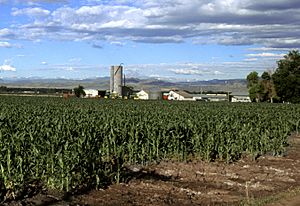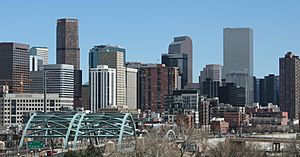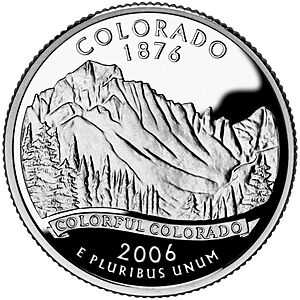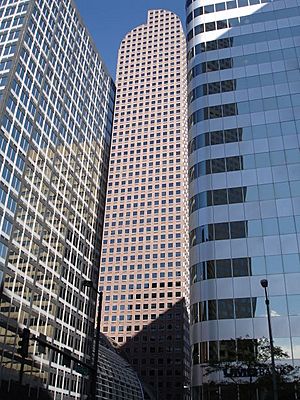Economy of Colorado facts for kids

Corn production in Colorado
|
|
| Statistics | |
|---|---|
| GDP | $382.5 billion (2020) |
|
GDP per capita
|
$63776 |
|
Population below poverty line
|
13.7% |
| 0.453 | |
|
Labor force
|
2,819,800 |
| Unemployment | 3.0% |
| Public finances | |
| Revenues | $8,586 million (2010) |
| Expenses | $7,722 million |
The economy of Colorado is all about how people in the state make and spend money. It's like the financial engine that keeps Colorado running! In 2008, Colorado's economy was one of the largest in the United States.
Long ago, in the mid-1800s, Colorado's economy was mostly about mining for valuable minerals. Later, farmers started using irrigation to grow crops. Raising livestock, like cattle, also became very important. Early businesses focused on getting minerals and farm products ready for sale. Today, Colorado still produces cattle, wheat, dairy products, corn, and hay.
Over the last 50 years, Colorado's economy has grown a lot. It now includes many different types of jobs and businesses. The state is known for its science research and high-tech companies. Other important industries include making food, building transportation equipment, creating machinery, and producing chemical products. Minerals like gold are still important too. Tourism is also a big part of Colorado's economy, with many people visiting for its beautiful mountains and outdoor activities. Denver, the state capital, is a major financial hub.
Contents
How the U.S. Government Helps Colorado's Economy

The United States government plays a big role in Colorado's economy. In 2013, about 53,800 people in Colorado worked for the federal government. This doesn't include military personnel. There were also over 37,000 active military members stationed in Colorado.
Colorado is home to several important federal facilities. For example, the North American Aerospace Defense Command (NORAD) is in Colorado Springs. This is where they watch for threats in space and the air. The United States Air Force Academy, where future Air Force leaders are trained, is also in Colorado Springs.
Other important government groups in Colorado include the National Oceanic and Atmospheric Administration (NOAA) and the National Center for Atmospheric Research (NCAR) in Boulder. These groups study the weather and climate. The National Institute of Standards and Technology is also in Boulder. It helps set standards for science and technology.
The Denver Federal Center in Lakewood has offices for many government agencies, like the United States Geological Survey. The Denver Mint makes coins for the country. The United States Court of Appeals for the Tenth Circuit is also in Denver.
A large part of Colorado's land is managed by the federal government. This includes 11 National Forests and four National Parks. Many private companies in Colorado also work with these government agencies.
Denver's Economic Powerhouse Role
Denver is the biggest city in the Rocky Mountain region. Its economy is strong because of its location. Denver is the largest metropolitan area around for hundreds of miles. This makes it a central place for many services.
Denver offers federal, high-tech, and educational services. It's also a hub for business, finance, and culture. Many goods are stored and distributed from Denver to other Mountain States. Several large companies in the central U.S. also have their main offices in Denver.
Denver's Geography and Trade Connections
Denver's location helps many federal agencies have offices there. Because of this, many companies that work on defense and space projects are also in the Denver area. Companies like Lockheed Martin and Ball Aerospace & Technologies Corp. are good examples. Since Denver is the state capital, it also provides many state government jobs.
Colorado has a lot of minerals and fossil fuels. This means many mining and energy companies have offices in Denver. In the past, finding gold and silver made Denver's economy boom. In the 1970s and 1980s, there was a big energy boom. Many new skyscrapers were built in downtown Denver during this time.
However, when oil prices dropped in the mid-1980s, Denver's economy struggled. Many oil industry workers lost their jobs. Today, energy and mining are still important to Denver's economy. Companies like Newmont Mining and Antero Resources are based there.
Denver's location in the Mountain Time Zone is also good for the telecommunications industry. This allows companies to communicate with both North American coasts, South America, Europe, and Asia during the same business day. Companies like Qwest Communications, EchoStar, and Comcast have operations in Denver.
In the late 1990s, Denver saw a boom in high-tech jobs. But after 2000, many of these jobs were lost. Recently, Denver's economy has started to recover. Leaders are working to make Denver's economy more diverse. This way, it won't be as affected by big ups and downs in one industry.
Colorado's Agricultural Impact
Colorado has a very active agricultural market. Ranchers and farmers in Colorado receive millions of dollars each year from the federal government. This money helps support their work. For example, they get payments for growing wheat and corn. They also receive funds for conservation efforts and for livestock and dairy farming. Sometimes, they get payments to help them recover from natural disasters.
Images for kids
-
17th Street, also called the "Wall Street of the West," is where many of Denver's banks and financial companies are located.




